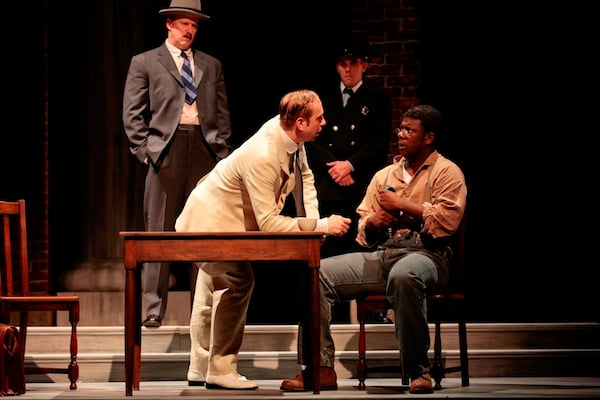James Konicek as Hugh Dorsey and Kevin McAllister as Newt Lee with (background) Michael Bunce and Matthew John Kacergis in the musical. Photograph courtesy Ford’s Theatre
☆☆☆ stars out of four
In 1913, a young girl named Mary Phagan, who worked in a pencil factory, was found murdered in a factory basement in Atlanta. The community was outraged, and politicians conspired to close the case quickly.
That day there were two men at the factory, which was closed to celebrate Confederate Memorial Day: the black night watchman Newt Lee (Kevin McAllister) and Leo Frank, a Jewish transplant from New York who was running the factory.
The governor (Stephen F. Schmidt) and the prosecutor (James Konicek) concluded that they wouldn’t get enough mileage over hanging another black man. So they focused on the Jew. This was a time when the South was still nursing its bruises from the “War between the States,” uncomfortable with the changes from a rural to an industrial economy, and rife with antisemitism as well as racism.
The prosecutor manufactured enough evidence to convict Frank. When the case aroused national furor, the governor commuted Frank’s sentence. This did not sit well with an angry mob of Georgians who broke into the prison where Frank was being held and lynched him.
This nasty piece of history hardly seems like the stuff of musical theater, but playwright Alfred Uhry executes it well.
Parade is a joint production with Theater J. It is part of Ford Theatre’s ongoing Lincoln Legacy project, which seeks to explore issues of racial and religious diversity in American life, both historically and in the present day.
Uhry won a Tony for this work as well as a Tony, a Pulitzer, and an Oscar for 1987’s Driving Miss Daisy. His work demonstrates that he’s very good at capturing the human side of the social dynamic. Uhry grew up Jewish in the South. He understands that Leo Frank would have been as much of an anathema to his Georgia-bred wife Lucille Frank (Jenny Fellner) and to the community of Southern not-too-Jewish Jews as he was to the rest of Atlanta in the early 1900s.
This story makes for high drama. In addition, the traditional music of the region and the syncopated beat of the times provide inspiration for Jason Robert Brown’s Tony-winning score. A finely nuanced performance by Euan Morton as Leo Frank and the powerful voices of Fellner and McAllister—who also played Jim Conley—among others, add to the luster of the production. Conley has two show-stopping numbers as the factory cleaner “eye-witness” to the crime who later dares the governor to prove that he himself committed it. Wade Laboissonniere’s costumes are period-perfect and Tony Cisek’s soaring set adds an important element to the drama.
Parade is compelling and occasionally brilliant, but it would be a better show if the first act was shorter. Call me a Yankee, but the seemingly endless paeans to the glory of the old South just slowed the pace too much for me. Act Two moved along and had better music too to boot.
It would also have been nice to have a clear account of the actual Leo Frank case in the program. Some theater goers leave uncertain of who really killed Mary Phagan.
Parade will be at Ford’s Theatre through October 30. Tickets (starting at $15) can be purchased through Ford’s Web site.


















